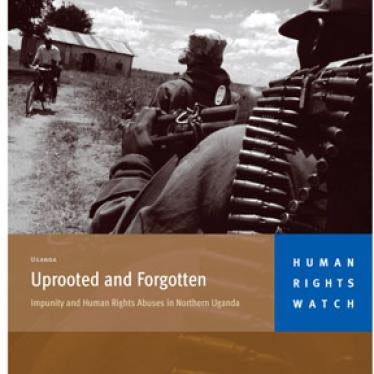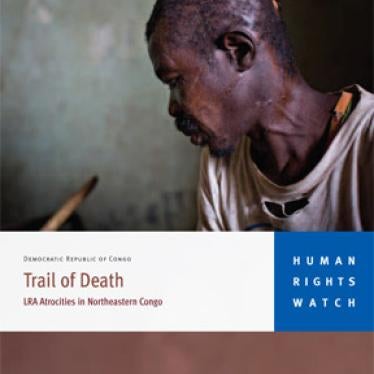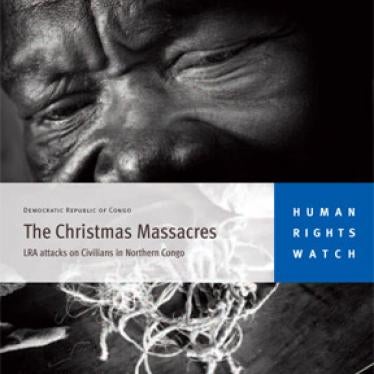The Ugandan military and the rebel Lord's Resistance Army continue to kill, rape and uproot civilians in northern Uganda with brazen impunity, Human Rights Watch said in a report released today.
A brutal rebel group responsible for countless atrocities, the Lord's Resistance Army continues to wage war against the Ugandan government, whose undisciplined army has committed crimes against civilians, the very people they are supposed to protect, with near-total impunity. Today, as the war continues into its 19th year, 1.9 million displaced civilians in northern Uganda remain isolated, ignored and unprotected, vulnerable to abuses by both rebel and army forces.
The 76-page report, “Uprooted and Forgotten: Impunity and Human Rights Abuses in Northern Uganda,” documents how the ongoing lack of accountability and civilian protection in the north has fueled atrocities by both sides. In each of the displaced persons camps visited, Human Rights Watch found cases of abuse by Ugandan government forces as well as rebel combatants.
“Uganda has asked the International Criminal Court to investigate and prosecute abuses by the Lord's Resistance Army,” said Jemera Rone, Uganda researcher at Human Rights Watch. “But the Ugandan army itself has carried out serious crimes that demand prosecution.”
The International Criminal Court assumed jurisdiction to investigate serious war crimes in northern Uganda last year after Ugandan President Yoweri Museveni referred the matter to the court. So far, the court has failed to effectively communicate its mandate to the people of northern Uganda. This has undermined the court's credibility and impartiality in the eyes of many there.
In recent years, the Lord's Resistance Army has committed atrocious crimes against the civilian population in northern Uganda. These crimes include torture and mutilation, abduction, sexual violence, forced recruitment, and killing of people it considers supporters of the government.
“Children have been the primary victims of rebel abuses, although adults have not been spared,” Rone said.
At the same time, soldiers in Uganda’s national army have raped, beaten, arbitrarily detained and killed civilians in camps. Some beatings are inflicted for minor infractions such as being outside the camp a few minutes past curfew.
“The Ugandan government has failed to pursue prosecutions of military officers before national courts that could put an end to such violations,” said Rone.
Abuses against civilians by Ugandan soldiers in Cwero and Awach displaced persons camps in Gulu district stood out among the 10 camps that Human Rights Watch visited in February and March. Human Rights Watch found that the 11th Battalion of the Uganda Peoples' Defence Forces (UPDF), based in Cwero and Awach camps of Gulu district, committed numerous deliberate killings and constant beatings of civilians during early 2005 when it was assigned to those camps. These abuses were not the acts of just a few undisciplined soldiers.
“Instead of holding the 11th Battalion's commanders accountable for the atrocities committed on their watch, the Uganda army transferred the unit to another area of the country where its soldiers and officers can continue to commit abuses of different innocent civilians,” said Rone.
The Ugandan armed forces have failed to prosecute or otherwise meaningfully discipline soldiers and their officers responsible for abuses in the north. No effective accountability structure exists in the camps. Reports of abuses by government forces rarely result in any investigation or prosecution of military personnel. While there is a military detachment in each camp, there are few police to provide for basic law and order.
Human Rights Watch also found that local civilian officials, police and the civilian criminal courts are not able to hold the army accountable, although they have jurisdiction over military personnel. Ultimately, the level of discipline, protection of civilians and accountability rests on the will and personality of the immediate commander.
“Justice in northern Uganda requires that the International Criminal Court thoroughly examine government forces' crimes against the civilian population as well as those committed by the rebels,” said Rone.
Human Rights Watch called for meaningful national prosecutions, which would be a valuable supplement to the International Criminal Court’s investigation. In addition, a broader truth-telling process would give people in northern Uganda a forum in which they could raise human rights abuses that occurred during the entire 19 years of war. This process could work alongside traditional remedies in which those affected wish to participate.







